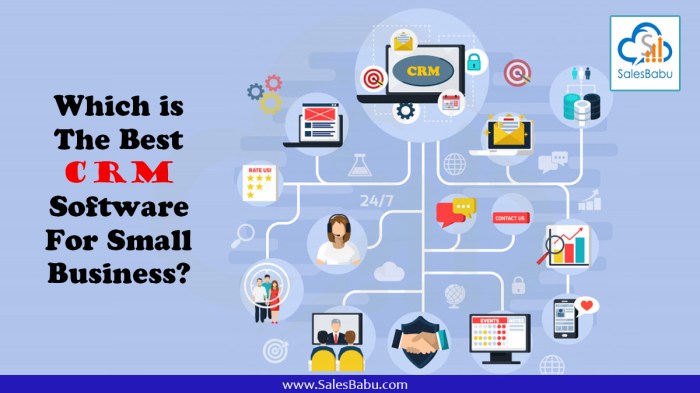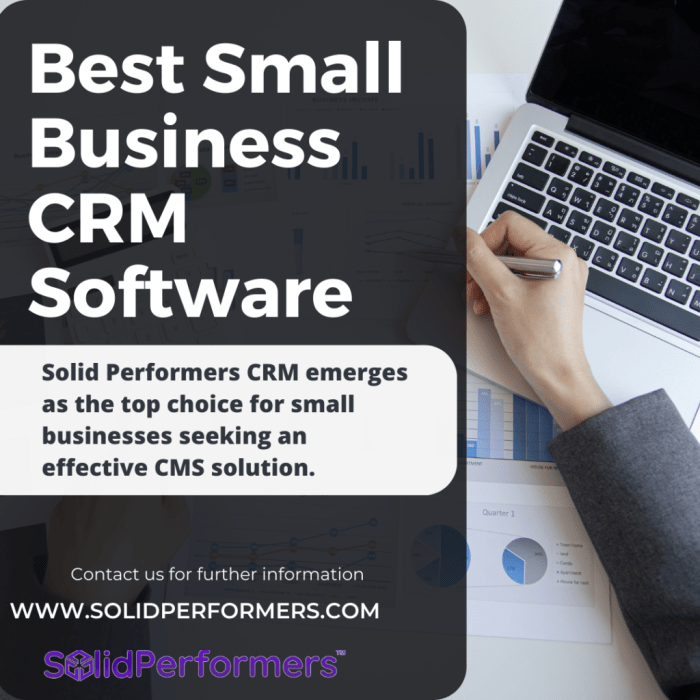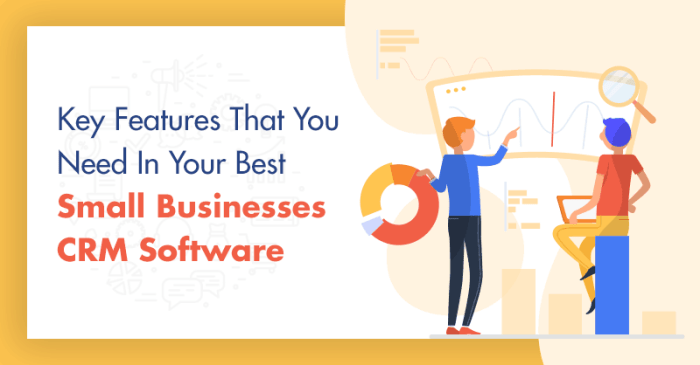Best crm and accounting software for small business – Running a small business requires juggling numerous tasks, from managing customer relationships to tracking finances. Efficient software can significantly streamline these processes, freeing up your time and resources to focus on growth. This comprehensive guide explores the best CRM (Customer Relationship Management) and accounting software options tailored for small businesses, helping you choose the perfect tools to boost your productivity and profitability.
Understanding Your Needs: CRM vs. Accounting Software
Before diving into specific software recommendations, it’s crucial to understand the distinct roles of CRM and accounting software and how they can complement each other. Choosing the right combination depends heavily on your business size, industry, and specific needs.
CRM Software: Managing Customer Relationships
A CRM system centralizes all your customer interactions. This includes contact information, communication history (emails, calls, notes), sales opportunities, and customer support tickets. A robust CRM helps you:
- Improve customer retention: Track customer interactions and preferences to personalize engagement.
- Boost sales: Manage leads, track sales pipelines, and identify high-potential opportunities.
- Enhance customer service: Quickly access customer information to resolve issues efficiently.
- Automate marketing tasks: Send targeted emails, create automated workflows, and manage social media interactions.
Accounting Software: Managing Finances
Accounting software is essential for managing your financial records. It automates accounting tasks, provides financial insights, and ensures compliance with tax regulations. Key features include:
- Invoicing and billing: Create and send professional invoices, track payments, and manage outstanding balances.
- Expense tracking: Record and categorize expenses to monitor spending and identify areas for cost savings.
- Financial reporting: Generate reports on income, expenses, profit margins, and cash flow.
- Tax preparation: Simplify tax preparation by organizing financial data and generating necessary reports.
- Bank reconciliation: Match bank statements with your accounting records to ensure accuracy.
Top CRM Software for Small Businesses: Best Crm And Accounting Software For Small Business
The market offers a variety of CRM solutions, each with its strengths and weaknesses. Here are some popular choices for small businesses:
HubSpot CRM: A Free and Powerful Option
HubSpot CRM is a popular choice for its free plan, offering a robust set of features for small businesses. It’s user-friendly, integrates well with other HubSpot tools, and offers excellent scalability as your business grows. [Source: HubSpot CRM Website ]
Zoho CRM: Affordable and Feature-Rich
Zoho CRM provides a comprehensive suite of features at a competitive price. It’s known for its customization options, allowing you to tailor the system to your specific business needs. [Source: Zoho CRM Website ]

Source: salesbabu.com
Salesforce Sales Cloud: Powerful but More Expensive
Salesforce is a leading CRM provider, offering a powerful platform with extensive features. While it’s more expensive than other options, its scalability and advanced capabilities make it a worthwhile investment for growing businesses. [Source: Salesforce Sales Cloud Website ]
Top Accounting Software for Small Businesses
Selecting the right accounting software depends on your accounting needs and technical expertise. Here are some leading options:
Xero: User-Friendly and Cloud-Based
Xero is a popular cloud-based accounting software known for its user-friendly interface and robust features. It’s ideal for small businesses that need a simple yet powerful solution for managing their finances. [Source: Xero Website ]

Source: solidperformers.com
QuickBooks Online: Comprehensive and Widely Used, Best crm and accounting software for small business
QuickBooks Online is a widely adopted accounting software offering a comprehensive suite of features, including invoicing, expense tracking, financial reporting, and payroll. It caters to various business sizes and industries. [Source: QuickBooks Online Website ]
FreshBooks: Simple and Intuitive for Freelancers and Small Businesses
FreshBooks is a user-friendly accounting software particularly well-suited for freelancers and small businesses. Its intuitive interface and focus on ease of use make it a popular choice for those new to accounting software. [Source: FreshBooks Website ]
Integrating CRM and Accounting Software: Synergistic Power
Integrating your CRM and accounting software can significantly enhance efficiency. When integrated, you can:
- Automate invoice creation: Automatically generate invoices based on sales data from your CRM.
- Improve cash flow management: Track payments and outstanding invoices in real-time.
- Gain deeper financial insights: Analyze sales data alongside financial reports for better decision-making.
- Reduce manual data entry: Eliminate duplicate data entry by syncing information between systems.
Many CRM and accounting software providers offer integrations or APIs (Application Programming Interfaces) to facilitate this connection. Consider this crucial factor when choosing your software.
Choosing the Right Software: Key Considerations
Selecting the right CRM and accounting software involves careful consideration of several factors:
- Business size and needs: A small business with limited resources might opt for a simpler, more affordable solution, while a rapidly growing business might require a more scalable and feature-rich platform.
- Budget: Software costs vary significantly. Consider both the initial investment and ongoing subscription fees.
- Ease of use: Choose software that is intuitive and easy for your team to learn and use.
- Integrations: Ensure the software integrates with other tools you use, such as email marketing platforms and payment gateways.
- Scalability: Select software that can grow with your business.
- Customer support: Reliable customer support is essential, especially when dealing with technical issues.
Frequently Asked Questions (FAQ)
Q: Can I use free CRM and accounting software?
Yes, several free options exist, such as HubSpot CRM. However, free versions often have limited features compared to paid plans. Consider your needs carefully before opting for a free solution.
Q: How much does CRM and accounting software cost?
Pricing varies greatly depending on the software and the features included. You can find options ranging from free plans to several hundred dollars per month for enterprise-level solutions. Look for pricing models that align with your budget and projected growth.
Q: What is the best CRM for a small e-commerce business?
Many CRMs work well for e-commerce, including Shopify’s built-in CRM or integrations with platforms like HubSpot or Zoho CRM, which can connect with your e-commerce platform to manage customer data and interactions effectively.
Q: How do I integrate my CRM and accounting software?
Integration methods vary depending on the software. Some offer direct integrations, while others might require using third-party apps or APIs. Check the documentation of your chosen software for specific integration instructions.
Conclusion
Choosing the right CRM and accounting software is a crucial step in streamlining your small business operations. By carefully considering your needs, budget, and future growth, you can select the tools that will optimize your efficiency and drive profitability. Remember to explore free trials or demos before committing to a particular software solution.
Call to Action
Ready to take your small business to the next level? Start exploring the CRM and accounting software options discussed in this guide and choose the perfect tools to empower your growth!
Frequently Asked Questions
What are the key features to look for in CRM software?

Source: cloudfront.net
Key features include contact management, lead tracking, sales pipeline management, customer support tools, reporting and analytics, and integration capabilities with other business software.
What are the essential features in accounting software?
Essential features include invoicing, expense tracking, financial reporting, bank reconciliation, tax preparation support, and payroll processing (if applicable).
How much should I expect to pay for CRM and accounting software?
Pricing varies greatly depending on features, scalability, and vendor. Expect to find options ranging from free plans with limited features to enterprise-level solutions costing hundreds of dollars per month.
Can I integrate CRM and accounting software?
Yes, many CRM and accounting software solutions offer integration capabilities, allowing for seamless data flow between the two systems. This automation improves efficiency and reduces manual data entry.
What if my business grows and my current software is insufficient?
Most reputable software providers offer scalable solutions. As your business expands, you can upgrade to a higher tier plan with increased features and capacity to accommodate your growth.
